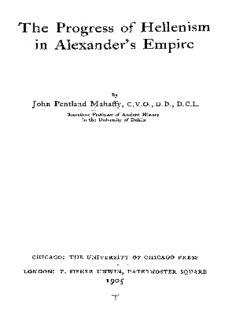Table Of ContentThe Progress of Hellenism
in Alexander's Empire
By
John Pentland MahafFy, C.V.O., D.D., D.C.L.
Sometime ProfessorofAncientHistory
inthe UniversityofDublin
CHICAGO: THE UNIVERSITY OF CHICAGO PRESS
LONDON: T. FISHER UNWIN, PATERNOSTER SQUARE
1905
T
7?
A- -!.o<iU!ru
copykight 1905
The University of Chicago
3
February, 1905
PREFACE
The following Lectures, delivered in the Univer-
sity of Chicago, represent the compendium of a
long and brilliant development of human culture.
To obtain a brief and yet accurate survey of it is
certainly a desideratum to various classesof readers,
and will, I trust, satisfy a real want. The general
reader, who desires to learn something of the ex-
pansion of Greek ideas toward the East, will here
find enough for a working knowledgeof a verycom-
plicated epoch. The specialist, who has devoted
himself to some department of this field, will find
here those general views of the whole which are
necessary to every inteUigent research into the parts.
More especially, the student or teacher of Christi-
anity will find here the human side of its origin
treated in a strictly historical spirit. To all such
this little volume may be as welcome as were the
lectures which compose it to the largeand verysym-
pathetic class who heard them in the summer of
1904.
Compendiums have so often been written bymere
literary hacks that the public has been misled to
believe it an easy task, which can be accomplished
at second hand. But no collection of extracts from
larger books ever made a sound hand-book. It
PREFACE
vi
must be produced fresh from the sources by one
who has made himself perfectly at home in the sub-
ject. It is, in fact, rather the work suited to the
close than to the beginning of a literary life. So far
at least these lectures satisfy the proper conditions.
This epoch has occupied me for more than twenty
years.
The appearance of Xenophon in this company
will seem novel to many; and it is so in truth. But
this new view of a familiar figure is amply justified
by the works which any sceptic may consult for
himself. This first lecture is, therefore, that which
will chiefly attract classical scholars, to whom Xeno-
phon is a household word in the class-room. If it
encourages them to read him through, instead of
confining themselves to his popular works, I shall
have attained what I mostdesire. TomyAmerican
readers, who have hitherto been very sympathetic
friends, I offer myrespectful greeting onthe appear-
ance of this my first American book.
P. M.
J.
Dublin, January, 1905.
CONTENTS
LECTUEE I pj^OE
....
Xenophon the Precursor ofHellenism i
LECTURE n
Macedonia and Greece 29
m
LECTURE
Egypt 63
lecture iv
Syria 91
lecture v
General Reflections on Hellenism 107
lecture vi
Hellenistic Influences on Christianity 125
. . . .
Index 151
XENOPHON THE PRECURSOR OF
HELLENISM
LECTURE
I
XENOPHON THE PRECURSOR OF HELLENISM
You have done me a high honour in asking me
to speakinthis great university. I shallbestexpress
my deep gratitude by economising your time and
by setting to work at once to teach what I can with-
out further excuse or preamble.
The first thing essential is that you and I should
understand one another, especially regarding the
topic ofmy discourse. I am not sure that all ofyou
agree with me in the meaning you attach to the
word "Hellenism." And no wonder; for ifyou read
the immortal Grote, you will find it used by him for
the high culture of Athens, and as the substantive
corresponding to the adjective "Hellenic." If, on
the other hand, you open the great work of Droysen,
theHistoryofHellenism,youwillfindthatitexcludes
the purest Greek culture, and corresponds to the
adjective "Hellenistic." As you may see from
the program of my lectures, I intend to use the word
in the latter sense, and to speak of that diffusion
of Greek speech and culture through Macedonia
and the nearer East which, while it extended the
influence, could not but dilute the purity, ofHellenic
civiUsation. I wish Grote had adopted from the
Germans the word "Hellenedom," to correspond
3
THE PROGRESS OF HELLENISM
4
with "Hellenic." Then all would have been clear.
Or perhaps I should have coined "Hellenicism,"
to correspond to "Hellenistic." But what chance
had I of accompHshing what the Roman emperor
despaired of-^adding a new word to one's mother-
tongue? I must therefore be content with repeating
that by "Hellenism" I mean that so-caUed "silver
age" of Greek art and Hterature, when they became
cosmopoHtan, and not parochial; and by "Hellen-
istic," not only what was Greek, but what desired
and assumed to be Greek, from the highest and
noblest imitation down to the poorest travesty.'
The pigeon EngHsh of the Solomon islander is as
far removed from the prose of Ruskin or of Froude
as is the rudest Hellenistic epitaph or letter from
the music of Plato's diction, but both are clear
evidence of the imperial quality in that language
which sways the life of miUions of men far beyond
the limits of its original domain. Yet it must needs
be that as the matchless idiom of Aristophanes
passed out to Macedonian noble, to Persian grandee,
to Syrian trader, to Egyptian priest, each and all of
these added somewhat of their national flavour, and
so produced an idiom and a culture uniform indeed
in apphcation, though by no means uniform in
construction.
'I noticewithsurprise that Mr. Bevan, inhis recentmas-
terlybookonTheHouseojSeleucus, usestheword "Hellenism"
indifferently in both senses, without apparentknowledgeof the
ambiguity.

